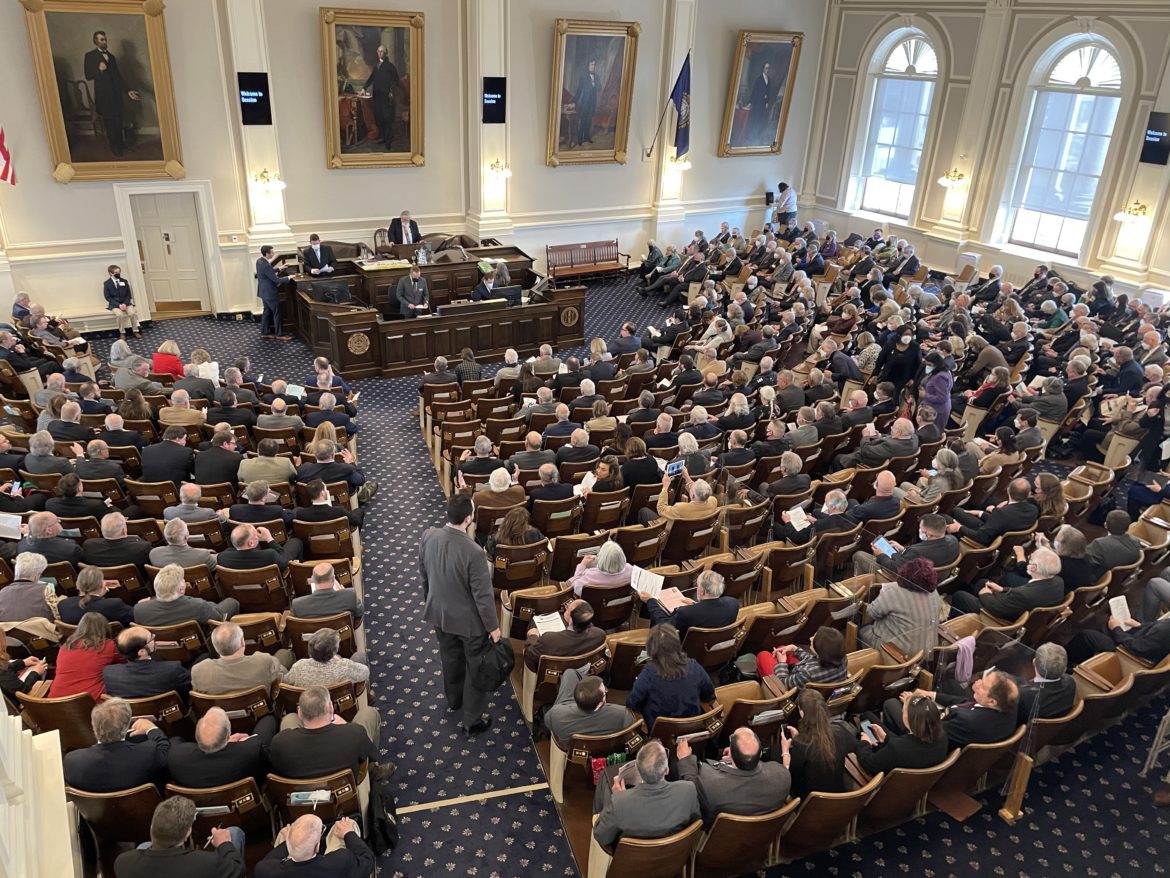By NANCY WEST, InDepthNH.org
In a split decision, the 1st Circuit Court remanded the appeal by disabled House Democrats seeking remote participation back to the U.S. District Court in Concord for further consideration.
The majority was clear that the order won’t end the contentious case. The appeal court’s role was solely to determine whether District Court Judge Landya McCafferty was wrong in holding House Speaker Sherman Packard’s claim of legislative immunity prevents the Democrats from getting the injunctive relief they sought.
“Because we conclude that the District Court did not err in so holding, we affirm the denial of the motion for the preliminary injunction and remand the case for further proceedings consistent with this ruling,” wrote Circuit Judge David Barron for the majority. He was joined by Circuit Judge Sandra Lynch, and Chief Judge Jeffrey Howard.
The case – Renny Cushing v. Speaker Sherman Packard was filed on Feb. 15, 2021. Cushing and six other Democratic House members sued Packard claiming he violated the Americans with Disabilities Act by failing to grant a reasonable accommodation that would permit the disabled House members to participate remotely.
Packard argued that they couldn’t sue because he had legislative immunity.
Rep. David Cote, D-Nashua, who was one of the plaintiffs, and took over as House Democratic Leader after Cushing’s recent death from cancer and complications from COVID-19, said their position remains the same.
“Our position remains that the Speaker of the House cannot use ‘legislative immunity’ as an excuse to prevent disabled representatives from participation in the legislative process,” Cote said.
He said he was disappointed by the court’s ruling on the request for preliminary injunction.
“(I)t is important to note that the court did not rule that disabled people must risk death to serve in the legislature and represent their constituents,” Cote said.
Cote said the court’s decision only related to preliminary injunction, not the Speaker’s denial of minimal accommodations for representatives with disabilities.
“Nothing except a desire to gain partisan advantage prevents the Speaker from doing the right, decent, and respectful thing,” Cote said.
Speaker Packard released the following statement after reviewing the 1st Circuit’s 3-2 decision affirming the District Court’s denial of the plaintiffs’ motion for a preliminary injunction:
“This opinion reaffirms the importance of the integrity of the legislature and the legislative process. Both the First Circuit and District Court evaluated the plaintiffs’ arguments and ruled against them. My next step is to continue working on legislation that will benefit the state of New Hampshire and keep pushing us forward,” Packard said.
Packard told WMUR that after four recent House session days back in the close quarters of Representatives Hall, only one House member reported testing positive for COVID-19.
Cote said: “Allowing a small number of disabled representatives to attend and vote digitally would ensure that all citizens of New Hampshire are equitably represented by their legislators and that the laws passed respect the will of all Granite Staters.
“We strongly believe the decision of the original panel and the powerful dissent in this case were correct and will ultimately be vindicated,” Cote said.
Cote was referring to the dissent in the 1st Circuit Court written by Circuit Court Judge O. Rogeriee Thompson joined by Circuit Judge William Kayatta Jr.
“As the COVID-19 pandemic raged to new heights in the winter of 2021, the New Hampshire House of Representatives conducted its sessions in person. Some members of the House have significant personal health issues, which put them at an increased risk of serious illness — or even death — if they were to contract COVID-19.
“Facing the unenviable choice between public duty and death, they sued the Speaker of the House, in his official capacity, for disability discrimination. But the Speaker told the court it would need to bounce the suit altogether without further ado: He says he is entitled to absolute legislative immunity, which shields judicial review of a House rule effectively ousting disabled members from that august assembly and (here’s the kicker) leaving their constituents unrepresented. My colleagues agree with the Speaker’s sweeping claim of absolute legislative immunity.
“I cannot abide by the Court’s decision to turn a blind eye to the effective disenfranchisement of thousands of New Hampshire residents simply because their representatives are disabled. But it’s not just that. My colleagues also today lay the foundation to immunize any legislative rule that ‘does not, on its face, target any class of legislators’ — a standard so broad as to immunize race – and – religion-based discrimination, too (examples to follow shortly). The Court’s rule opens the floodgates to potential abuse and spells a recipe for disaster in the future. I respectfully dissent,” wrote Thompson.
The majority wrote that a “request for a preliminary injunction is a request for extraordinary relief.”
It can only be granted if the plaintiffs are likely to succeed and likely to suffer irreparable harm among other criteria, Barron wrote.
“We are mindful of the seriousness of the threat to public health that the COVID-19 virus poses,” Barron wrote for the majority. “Indeed, we have held our proceedings in this case remotely in accord with our own protocols for dealing with that threat. But, our task in this appeal is not to determine the most advisable means of conducting governmental operations during the pandemic.
“Nor is it to decide how the ADA’s and the RHA’s requirements to provide reasonable accommodations to those with medical vulnerabilities apply in the face of the peculiar risk that this specific virus presents.
“It is solely to determine whether the District Court erred in holding that the Speaker’s assertion of legislative immunity prevents the plaintiffs from obtaining the preliminary injunctive relief that they seek,” Barron wrote.
Attorney Paul Twomey, who represents the plaintiffs, said the two dissenting judges got it right.
“The case will go back to the District Court and presumably have a meeting or hearing to see what’s next,” Twomey said.
Rep. Paul Berch, D-Westmoreland, also a plaintiff said, “While it is regrettable that the First Circuit Court of Appeals rejected our request for a permanent injunction, this is one step in a many stepped process.
“The plaintiffs and the legal team are assessing the different choices of where to go next. It is important to note that the First Circuit did not rule on the underlying issue- deciding whether the Speakers prerogatives in running the NH House are superior or subordinate to the right of disabled legislators to do their elected job with minimal accommodations under the Americans with Disabilities Act. This is an important lawsuit with national implications and does not end here,” Berch said.





